Welcome to the first MRU of the new year.
After a solid break, I’m eager to get back into the swing of things around here. There’s a lot of work to do, so let’s get started by catching up on some of the most notable stories.
A new era: I think I speak for many city lovers when I say there’s nervous excitement as New York City’s congestion pricing program has finally gotten underway with a $9 per car fee. There are hopes that once the dust settles, charging drivers more to drive in central cities and using the money to fund driving alternatives could spread beyond Manhattan. (NPR)
Zero emissions: I loved reading about these new “zero emissions zones” in cities in The Netherlands because it made me proud that PBOT already has a similar program in place. (Zag Daily)
Cars are the new cigarettes: The deadly rampage of a large truck driver in New Orleans is just the latest thing to ramp up the campaign against “car bloat” and its risks to us all. An expert on the topic thinks the advocacy approach should mimic how we used secondhand smoke to change smoking culture. (Vox)
Two chains: Very cool to see innovation in utility bikes made for use in Africa. Instead of a derailleur, SRAM developed a two-chain, two-speed drivetrain system. Can anyone tell how a rider switches between the two chains? (Cycling Weekly)
Crime trucks: America’s crime truck problem also includes this guy in Dallas, OR who drove into a convenience store and proceeded to steal beer and cigarettes before trying to escape and then eventually came to his senses. (KOIN)
AI doesn’t see you: “It’s classic Silicon Valley hubris to assume Waymo’s ability to predict my behavior supersedes a law designed to protect me,” says a reporter who was not yielded to by a robotaxi. (Washington Post)
Happy times: A new study shows that once someone drives enough to be considered “extremely car-dependent” they also become less happy. (The Guardian)
Olympic effort: The buzz in Los Angeles is how best to manage traffic as the world descends on the car culture capital of America for the 2026 World Cup and 2028 Olympic Games. How about a massive shift toward transit and other non-driving modes like bikes and scooters? This article is a good summary of where those conversations stand. (BBC)
Thanks to everyone who sent in links this week. The Monday Roundup is a community effort, so please feel free to send us any great stories you come across.



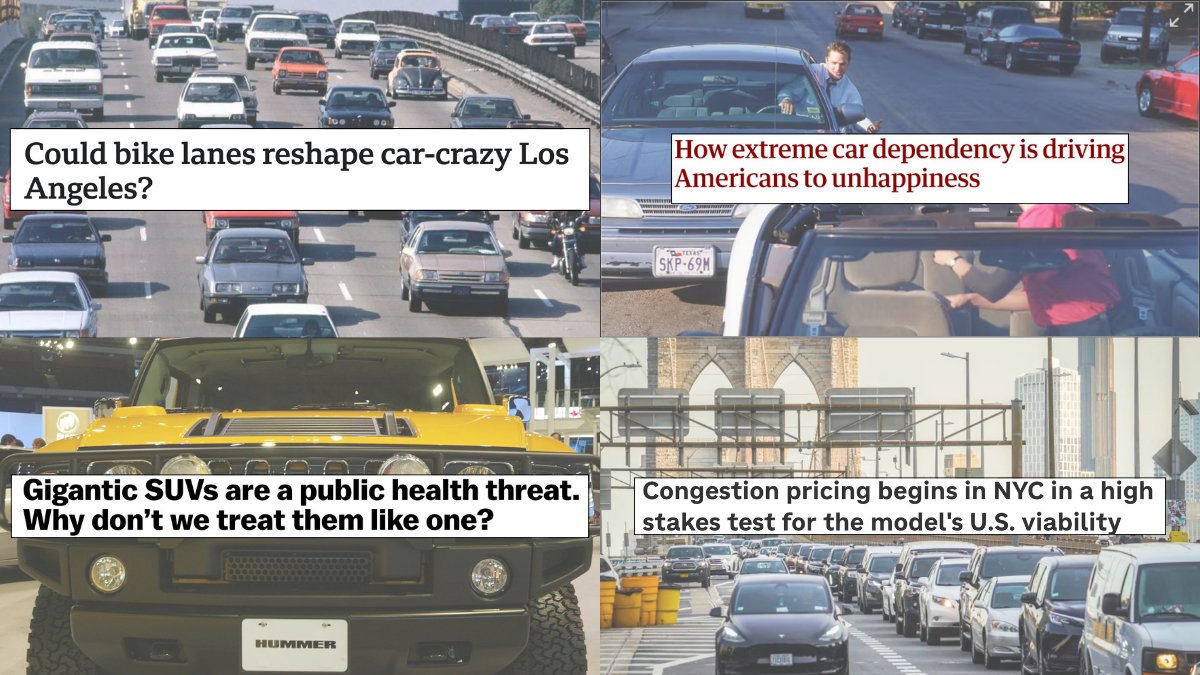
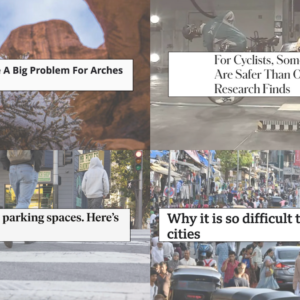
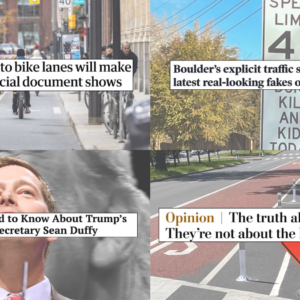
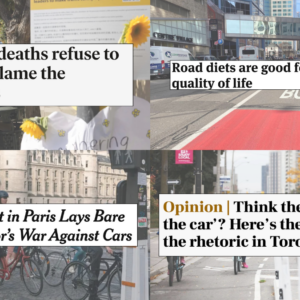
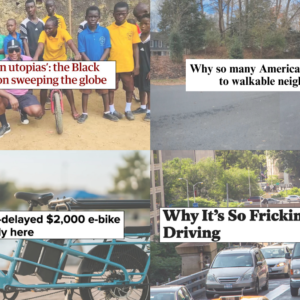
Thanks for reading.
BikePortland has served this community with independent community journalism since 2005. We rely on subscriptions from readers like you to survive. Your financial support is vital in keeping this valuable resource alive and well.
Please subscribe today to strengthen and expand our work.
I may be mistaken, but the two speed kick shift changes gears by briefly pedaling backwards. It’s pretty neat but not necessarily a new concept. Maybe it’s improved somehow?
Going through places like Cuba you tend to see crazy but practical mods to bikes (e.g., motorcycle chains, absence of bottom bracket) due to the limited supply of parts etc. I get that external derailleurs can break (have done a few in) and internal derailleurs are generally no fuss. But I’d be interested to see how well they stand up to wear and tear vs the admittedly more tedious single speed swap wheel. Nothing like low-tech to keep stuff from breaking and maintained. Wood scooter-bikes in the DRC can attest to that.
Here’s a quick vid on the DRC scooter-bikes aka “Chukudu.” I’d imagine the bearings and suspension are the few parts that would be more difficult to source. WBR is a cool foundation. Their bikes are awesome (flexible functionality), and they also supply people who want to be mechanics. Would be interesting to know how easy their bikes are to maintain.
Pedaling backwards half a turn shifts according to the product video here: https://worldbicyclerelief.org/s2/
Thanks for pointing that out. Very cool.
“…the new cigarettes”
Recent explicit terrorism using motor vehicles as weapons in the US, as well as other places, brings home the desirability of separating private motor vehicles from spaces where people gather. It makes me sad that we couldn’t figure this out without so many deaths and such awful injuries.
Zero emission zones for urban freight: …”A fine will automatically be issued in the mail if a vehicle is deemed to be in offence.”
One thing that’s broken in Oregon transportation policy: Tickets are issued only to identified drivers as opposed to the owner of a vehicle. Parking is an exception, but delivery fleet operators seem to shrug off parking violations. If parking tickets were assessed from fixed cameras that might make a difference.
Delivery companies generally don’t worry about parking violations because the big ones have a negotiated flat “pay all the parking tickets” deal with the city. That saves everyone hassle (no need to issue individual tickets, no need to follow parking regulations), even if it makes a mockery of the whole system.
Compare the cost of a ticket to the cost of paying a driver to spend the time to park legally; if they spend too much time finding legal parking, you need to hire an additional driver and get another truck.
Tickets are cheap by comparison, and are, literally, a cost of doing business.
The convenience store drive thru incident happened in Dallas, OR, not The Dalles 🙂
oops! Thanks. Fixed that.
Anti-bike lane folks in LA (and Portland, and everywhere else): our cars are a key contributor to global warming, we hate spending extended time in them, and they make us unhealthy. So…we should probably double down and make sure that no one has any alternative to driving a car. Yeah, that should fix things.
Portland’s fake emission-free zone is still in the planning phase so, no, PBOT does not have a similar program in place.
https://www.portland.gov/transportation/planning/zero-emission-delivery/zero-emission-delivery-zone#toc-when-is-this-happening-
Moreover, this miniscule area will have no cameras or automated fines and only covers a few blocks owned by the city and federal government while leaving most of the downtown area a petro-zone. And, laughably, there are loading docks for conventional vehicles adjacent to many of the buildings located in this so-called emisson-free zone.
Amsterdam’s emission-free zone, on the other hand, covers much of central amsterdam — an area roughly equivalent to all of central portland and is aggressively enforced by automated license plate readers.
yeah definitely not an apples to apples comparison. Hence my use of the term “similar”. Obviously I realize they are not the same in scope. I was being generous to PBOT and am eager for that pilot to begin and hopefully expand.
Generosity for Portland’s MORAL failures is very annoying and not at all merited.
Well heck. If PBOT has something like a good idea and all they get is more slaps, how is that going to work?
I just hope that the incremental bits of stuff like the rose lane fragments can show numbers that people will want to build on.
On the topic of LA: I think that it has too poor of a reputation. It’s far better to ride public transit or bike in then Dallas, Phoenix, or Orlando. I mean there are almost biblical issues of poor coordination and planning – like the balkanization of transit agencies across municipal lines – but LA Metro is the second or third most ridden transit agency in the US. Meanwhile, DART (Dallas) gets less transit ridership than Portland despite being like 5x larger. Phoenix is even worse, where the entire Phoenix urbanized area ridership on par with Pace, the suburban bus provider in Chicagoland. Orlando gets barely 1/6th the ridership of Portland despite being a similar size.
LA is already dense enough to support high-quality public transit on basically any corridor you can imagine. It’s just also bafflingly expensive to build and has at times been almost too corrupt to take seriously (just read about the history of the Red Line if you are curious about more).
I was in LA last October and I decided to not rent a car and see if I could just get around by transit. I had a great time. I even convinced a friend who lived there to take the train with me, and he also liked it. It was just a reminder to me about how much of transportation is just habit. It even happened to me here when I started biking. I would still use my car as a default. It was ready, easy and comfortable. Switching to anything else took some thought and planning.
Whenever I’m in LA I ride my bike everywhere, and I have a good time because I’m with friends and family. But LA is fucked by auto dependence in the sense that public life on the street can’t exist in most of it, despite the fact that— which you point out — it is indeed dense enough for transit to make sense. I wish there was a train running down Sunset.